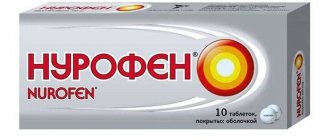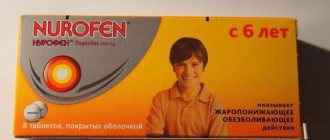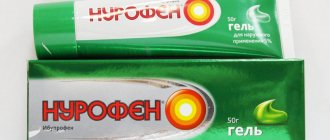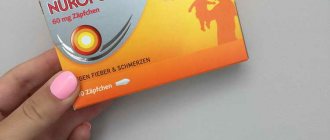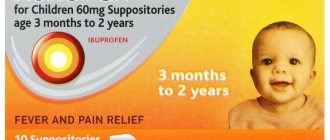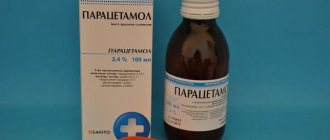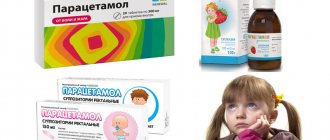In the life of every child, there may be a process of teething, a simple cold, or adaptation to a new kindergarten. All these processes are accompanied by at least a rise in temperature, pain, and other symptoms that accompany colds. Today I invite you to discuss one of the medications that is prescribed specifically to eliminate symptoms of this kind - Nurofen.
Release form
Nurofen is available in several forms, thanks to which each patient can choose the most suitable option for himself. In pharmacies you can find the drug in this form:
- Tablets for oral administration.
- Effervescent tablets for preparing a solution.
- Capsules.
- Gel for external use.
- Suppositories.
- Suspension.
Depending on the form of release, each drug has its own name, for example: Nurofen Forte, for children, etc. Today I propose to focus on one of the most convenient forms of the drug for the treatment of infants - suspension. The fact is that the medicine in this form has a very pleasant, sweetish orange or strawberry taste, so there is no need to force children to drink it.
At the same time, the syrup is sold in plastic bottles, so you can always take it with you on the road without worrying that the bottle will break. The product is sold in volumes of 100, 150 and 200 ml, but each comes with a convenient dispenser syringe. With its help, you can accurately measure the required amount of syrup and give it to your child.
How does it affect the body? (Pharmacodynamics)
Ibuprofen, being a non-steroidal anti-inflammatory drug, reduces the body's production of type E and F prostaglandins. These substances accompany any inflammatory process in the human body. Prostaglandins irritate the thermoregulation center, which is located in the hypothalamus. Under their influence, it begins to produce substances that increase temperature. In addition, prostaglandins increase the susceptibility of CNS receptors to pain mediators: bradykidin and histamine. When the level of prostaglandins decreases, body temperature normalizes and pain decreases, regardless of the cause that caused it. It has been proven that ibuprofen increases the body's production of interferons, which are necessary to fight infection. Although the action is similar to that of drugs containing paracetamol, WHO recommends its use as an antipyretic only when paracetamol is ineffective or contraindicated.
Operating principle
The syrup can have antipyretic, anti-inflammatory and analgesic effects. It is very quickly absorbed by the walls of the gastrointestinal tract and, accordingly, quickly begins its work. If the medicine was taken on an empty stomach, then it can be detected in the blood plasma within 15 minutes.
If the drug was drunk with food or immediately after eating, then in this case, the period of time during which the active substance enters the blood increases to 60 minutes.
Expert opinion: what do pediatricians say?
Paracetamol contains active substances that have antipyretic and anti-inflammatory effects. The latter is so insignificant that it can be neglected. Therefore, an analogue is prescribed - Nurofen or Ibufen. They can relieve pain, reduce fever, and have a strong anti-inflammatory effect. Paracetamol contains only an analgesic and an antipyretic. Nurofen contains a complex of substances. Paracetamol will help an adult with the primary symptoms of flu or a cold, but a child will not.
If the disease is prolonged, there is no point in treating it only with suppositories. Paracetamol maintains the temperature so that it does not rise, say, until the next dose of Nurofen. For example, after Nurofen the temperature rose, but 6 hours had not passed. They give Paracetamol to prevent the temperature from rising, and after 4 hours they give Nurofen again. If we are talking about a re-infection, acute respiratory infection, how many days after can you give Nurofen after Paracetamol? In this case, there are no restrictions, since the substances leave the body within half a day.
Indications
According to the instructions for use, Nurofen suspension for children is prescribed for:
- Symptomatic treatment of high fever as a result of acute respiratory infections or influenza.
- Children's infections.
- Other infectious and inflammatory diseases.
- The body's reaction to a routine vaccination, which is accompanied by fever or pain at the injection site.
- Pain syndromes of weak and moderate intensity. These include: migraines, headaches, toothaches, pain in the ears, throat, sprains, rheumatic pain, pain in joints and muscles.
But at the same time, it is worth remembering that the syrup provides only symptomatic therapy; it reduces pain and inflammation only at the time of taking the drug. It does not affect the development of the disease in any way.
How soon can Nurofen be given to children again?
Regardless of the dosage form chosen (suppositories or syrup), it is recommended to use Nurofen at 6-8 hour intervals. If the effect of the drug was not strong enough, and after 2-3 hours the child’s temperature rose again or pain appeared, then you should try to eliminate them using other means. For example, if the patient does not have allergies, then you can wipe him with water and vinegar.
If traditional methods do not help, then parents may be tempted to give the medicine again. But you need to remember that using ibuprofen too often can lead to an overdose of the drug, which will lead to complications.
Contraindications and side effects
Nurofen syrup has the following list of contraindications:
- Hypersensitivity to the active component of the drug - ibuprofen or to any other component of the drug.
- Bleeding and perforation of gastrointestinal ulcers, which were provoked by taking non-steroidal anti-inflammatory drugs.
- Erosive and ulcerative diseases of the gastrointestinal tract.
- Severe liver failure or active liver disease.
- Diseases of the optic nerve.
- Severe renal failure.
- Heart failure or period of time after coronary artery bypass grafting.
- Bleeding disorders and hemophilia.
- III trimester of pregnancy.
- The baby's body weight is less than 5 kilograms.
The drug is prescribed with special caution for allergic reactions and bronchial asthma, diabetes mellitus, blood diseases, including those of unknown origin of the disease, gastritis, colitis.
The main rule for using Nurofen syrup for children is to take the recommended dosage and short-term treatment. Otherwise, adverse reactions may occur. These include:
- From the lymphatic system and blood: very rarely the process of hematopoiesis itself can be disrupted, and as a result anemia, leukopenia, and pancytopenia may occur. The first symptoms that indicate the onset of complications are considered to be: fever, sore throat, general weakness, nosebleeds and subcutaneous hemorrhages.
- On the part of the immune system, reactions atypical for the body may occur. For example, bronchial asthma, redness on the skin, and allergic rhinitis may occur. In especially rare cases, severe forms of allergic manifestations occur: swelling of the face, throat and larynx, tachycardia.
- From the gastrointestinal tract, abdominal pain, nausea, vomiting, constipation, diarrhea, and flatulence are rarely observed. Very rarely, gastric bleeding, gastritis, ulcerative stomatitis, and hematemesis may occur.
- Possible disorders of the biliary tract and liver.
- Disturbances in the functioning of the kidneys and urinary tract are very rare, namely: acute renal failure, papillary necrosis.
- Headache may occur as a result of the drug's effect on the nervous system.
- From the cardiovascular system, heart failure and increased blood pressure may occur, and with longer use there may be a risk of thrombotic complications.
- From the respiratory system, shortness of breath, bronchospasm, and bronchial asthma may be noted.
Adverse reactions
Nurofen in children can cause the following side effects:
- decrease in the number of platelets, leukocytes and hemoglobin;
- abdominal pain, nausea, vomiting, indigestion, stool retention, bloating, rupture of the walls of the digestive tract, blood in the stool or vomit, erosive and ulcerative lesions of the gastrointestinal tract, exacerbation of Crohn's disease and ulcerative colitis, stomatitis and gastritis;
- headache;
- serous meningitis, which occurs in patients with autoimmune pathologies;
- swelling of the limbs;
- heart failure, arterial hypertension;
- liver dysfunction, inflammation;
- acute renal failure;
- dyspnea;
- narrowing of the bronchi, bronchial asthma;
- increased activity of liver enzymes and creatinine levels;
- prolongation of bleeding time;
- decreased blood sugar levels;
- decreased creatinine clearance.
Instructions for use and dosage
Shake the bottle of syrup before use. To make it convenient for you to measure the required dose, a measuring syringe is always included in the kit. To draw the medicine into it, you need to bring the syringe to the neck and turn the bottle over. By gradually moving the plunger to the desired level, you can easily draw the required amount of medicine. Then transfer the syringe into the baby’s mouth and slowly press the plunger, releasing the medicine into the baby’s mouth.
After use, the syringe should be rinsed in warm water and left to dry out of the reach of children. For young patients who have increased stomach sensitivity, it is recommended to take the medicine with meals.
How often can Nurofen syrup be given to a child?
The daily dose of the drug depends not only on the age of the baby, but also on its body weight. It should be no more than 30 mg/kg.
- Children aged 3-6 months, when their weight is 5-7.6 kg, can be given 2.5 ml no more than 3 times a day.
- Children aged 6-12 months and the baby's weight is in the range of 7.7-9 kg can be given 2.5 ml no more than 3-4 times a day. That is, the maximum permissible dose in 24 hours is no more than 10 ml per day.
- Children aged 1-3 years , with their weight reaching 10-16 kg, are allowed to take 5 mg of medication up to 3 times a day, that is, no more than 15 mg in 24 hours.
- Children 4-6 years old and weighing 17-20 kg are allowed to take 7.5 mg up to 3 times in 24 hours. But the daily dose should not exceed 22.5 mg.
- Children 7-9 years old and weighing 21-30 kg are allowed to take 10 ml of the drug up to 3 times in 24 hours. The daily dose in this case is no more than 30 ml.
- Children 10-12 years old , whose body weight is 31-40 kg, are allowed to take 15 ml up to 3 times a day, but not more than 45 ml in 24 hours.
The course of treatment should be no more than three days. If after this period of time no improvement in health is observed, in addition, the symptoms, on the contrary, intensify, then in this case it is necessary to stop taking Nurofen syrup and consult a doctor.
How dangerous (and is it dangerous?) is the drug for a child?
Contraindications
The drug should not be used if there are allergic reactions to its components, or with bronchial asthma (may provoke bronchospasm).
In addition, ibuprofen is contraindicated for liver and kidney diseases, peptic ulcers (reduces the production of mucus that “protects” the stomach), and blood clotting disorders (reduces this indicator).
Side effects
The development of side effects is unlikely and occurs extremely rarely. This may be a spectrum of allergic reactions (the appearance of a rash, the development of edema, difficulty breathing, etc.), overexcitation, sleep disturbances, kidney function, tachycardia, bronchospasm, worsening blood clotting.
If these symptoms occur, you should immediately stop taking Nurofen and consult a doctor .
Overdose
Symptoms of overdose can only be observed if the baby has taken a dose of the drug that exceeds 400 mg/kg. Signs of overdose include: nausea, stomach pain, vomiting, tinnitus, diarrhea, headache, bleeding in the gastrointestinal tract. In rare cases, manifestations from the nervous system may be observed, for example, drowsiness, in more rare cases - convulsions, drowsiness, disorientation.
In severe stages of poisoning, renal failure, liver tissue damage, decreased blood pressure, and respiratory depression may develop. In young patients diagnosed with bronchial asthma, their condition may worsen.
If you observe at least one of several symptoms in your baby, you should immediately stop taking the drug and consult a doctor.
First of all, your actions should be aimed at facilitating the baby’s breathing and monitoring basic vital signs until the condition is completely normalized. In the first hour after taking an increased dose of the drug, it is necessary to give activated charcoal to children and perform gastric lavage. If the absorption time of the active substance has passed, then alkaline drinking in large quantities can be prescribed in order to remove the acidic derivative of ibuprofen by the kidneys.
Let's sum it up
Nurofen is a remedy for relieving fever and pain that has a complex effect. The drug is not an antibiotic; it belongs to the group of non-steroidal anti-inflammatory drugs. Prescribed for impaired thermoregulation, incl. after vaccinations. Main features of the reception:
- The recommended frequency of administration is three times a day (10 mg per 1 kg of weight - the average recommended dosage);
- if you do not give a repeated dose in a row and do not exceed the dosage according to age, then the risk of adverse reactions is minimized;
- take into account the possible incompatibility of ibuprofen with a number of other substances.
If 4 hours after the first dose the temperature remains at the same level, it is recommended to give the child another drug: Panadol or something similar that corresponds to the age category.
If there is no positive effect of therapy, you should consult your doctor.
Interaction with other drugs
When treating with Nurofen syrup, you should avoid taking medications such as:
- Acetylsalicylic acid. The only exception can be very low doses of acid, no more than 75 g per day. However, these two drugs can only be taken after consulting a doctor, since acetylsalicylic acid in combination with Nurofen can cause severe side effects.
- You should avoid taking other non-steroidal anti-inflammatory drugs with Nurofen, as again, the risk of side effects increases.
Nurofen should be used with extreme caution together with anticoagulants and thrombotic drugs, antihypertensive drugs, cardiac glycosides, lithium drugs, methotrexates, cyclosporins, mifepristones, quinolone antibiotics, tacrolimus.
"NUROFEN": tablet composition
- The main component is a derivative of methylacetic acid and belongs to the group of non-steroidal anti-inflammatory drugs. Ibuprofen reduces fever and relieves pain of any origin.
- Added additional components:
- sodium salts (croscarmellose, citrate dihydrate, lauryl sulfate),
- macrogol, which improves drug absorption,
- talc,
- sucrose,
The Nurofen tablet contains 200 mg of the active ingredient. The number of hard pills in a blister is 10 pieces, sold in branded cardboard packages of 1 or 2 blisters (10 or 20 pieces).
Analog of Nurofen for children
Ibuprofen for children. The active ingredient is also ibuprofen. The drug is available in the form of tablets and suspension, which is also very convenient for treating infants. Indicated in the treatment of ENT diseases, headaches and toothaches, traumatic inflammation of soft tissues and the musculoskeletal system.
Orafen also contains the main active ingredient ibuprofen. The drug is prescribed for the treatment of elevated body temperature due to viral diseases or after immunization. In addition, the medicine can be prescribed for the treatment of moderate to severe headaches, toothaches, and inflammatory pains. Orafen effectively relieves pain during teething and tooth extraction.
Nurofen suppositories for children. The drug is used at elevated temperatures in patients from 3 months to 2 years. This remedy can be used to treat pain of varying intensity.
Ibufen is very often used in pediatrics, since its main purpose is to relieve pain during teething. In addition, it can be prescribed to eliminate post-vaccination reactions and as one of the means of complex therapy for acute respiratory viral infections and influenza.
Ibuprom is prescribed to relieve pain of various origins. The main active ingredient is also ibuprofen. In addition, the drug can be prescribed as an antipyretic, as well as one of the elements of a complex for the treatment of infectious and inflammatory diseases of the ENT organs.
Features of the drug use
The accumulation of excess heat during viral and bacterial infections is a natural protective reaction of the body. An increase in temperature is associated with activation of the immune system, which creates unfavorable conditions for the development of pathogens. For this reason, you should not bring down the temperature as soon as it appears. Parents are often concerned about the mechanism of action and features of taking the drug:
- The active component interacts with mediators of pain and hyperthermic reaction (prostaglandins) and has a rapid targeted effect.
- An antipyretic can be given to children at temperatures above +38.5…+39°C. However, in pathologies accompanied by pain, taking the drug is justified at lower levels. For otitis and sore throat, teething, the medicine not only stabilizes body temperature, but also additionally alleviates the child’s condition, reducing the severity of pain.
- Features such as the duration of therapy and how many days Nurofen can be given to a child depend on the clinical picture of the disease. Without agreement with the pediatrician, the medicine should not be taken for more than 3 days.
Recommendations for how long after which Nurofen can be given to a child are the same for suspension and tablets. The medicine can be given again after 6 or 8 hours. This period of time corresponds to the duration of action of the drug. Reducing the required interval will lead to an increase in the daily dose of the substance. This will increase the risk of developing systemic disorders in the body.
Reviews
- Alina: “I consider Nurofen syrup the best remedy for high temperatures. When my little one gets a cold and the temperature rises, I immediately give this drug. Over several years of use, we have had no adverse reactions. Therefore, I think that it is very important to adhere to the dosage, and everything will be fine. By the way, when I have a fever, I also drink Nurofen syrup, only in a larger dosage. It reduces it in 20-30 minutes, and the effect lasts for several hours.”
- Ekaterina: “I have two children. As soon as my youngest appeared, I immediately bought Nurofen, because I know for sure that it is an excellent pain reliever and reduces fever. But unlike the eldest daughter, my son did not like this drug. Now I buy Ibuprofen for my son, and Nurofen for my daughter, both medications give results, so I can’t say which is better. Probably everyone should choose based on the characteristics of the body.”
- Oksana: “Despite the fact that we always have Nurofen in our medicine cabinet, recently I began to notice that it cannot cope with temperatures above 39°. Perhaps they started making fakes here too, although before I was absolutely satisfied with its effectiveness.”
- Marina: “We were prescribed Nurofen by our pediatrician when we were about to get a DTP vaccine, as it can relieve fever and numb the injection site. The first vaccination was very difficult for us, the baby’s leg began to hurt, but we started giving Nurofen every 6 hours, and the pain slowly subsided, although the lump at the injection site remained for several days.”
- Christina: “I give my child Nurofen when we have another tooth coming. This usually occurs with a temperature of at least 39° and severe pain. This syrup helps us a lot, but I usually try to give a dose less than stated in the instructions, since the list of side effects is still frightening.”
What side effects may there be?
If the medicine had no side effects, then there would be no question whether Nurofen can be given to a child. As a rule, they arise in cases where contraindications have been neglected.
Side effects may include the following:
- if you have problems with the digestive system, nausea, vomiting, diarrhea, stomach bleeding, and ulcers may occur;
- allergies are possible in various manifestations, ranging from skin redness to epidermal necrolysis;
- loss of sleep, overexcited state, disorientation in space;
- dysfunction of the urinary system: renal failure, cystitis, difficulty urinating;
- various blood pathologies: anemia, leukopenia and others.
As you can see, side effects pose a real threat to the child’s life, so you need to carefully consider the question of whether children can take Nurofen.
Video
I suggest you watch a short video that describes all the features of Nurofen syrup.
As you can see, this drug has a lot of advantages, so it has rightfully earned its place in the first aid kit for a newborn. But, at the same time, you should strictly adhere to the indicated dosage. Definitely, do not forget about regular use of vitamins. If the season does not allow you to diversify your baby’s diet with fresh fruits and vegetables, purchase special vitamin complexes, such as Pikovit for children or Supradin Kids. Such complexes contain all the necessary microelements and vitamins to strengthen the immune system and the active growth of a healthy baby. Now share your reviews of Nurofen syrup in the comments on the website: have you tried giving it to your baby, and how quickly did you see the effect of the treatment?
